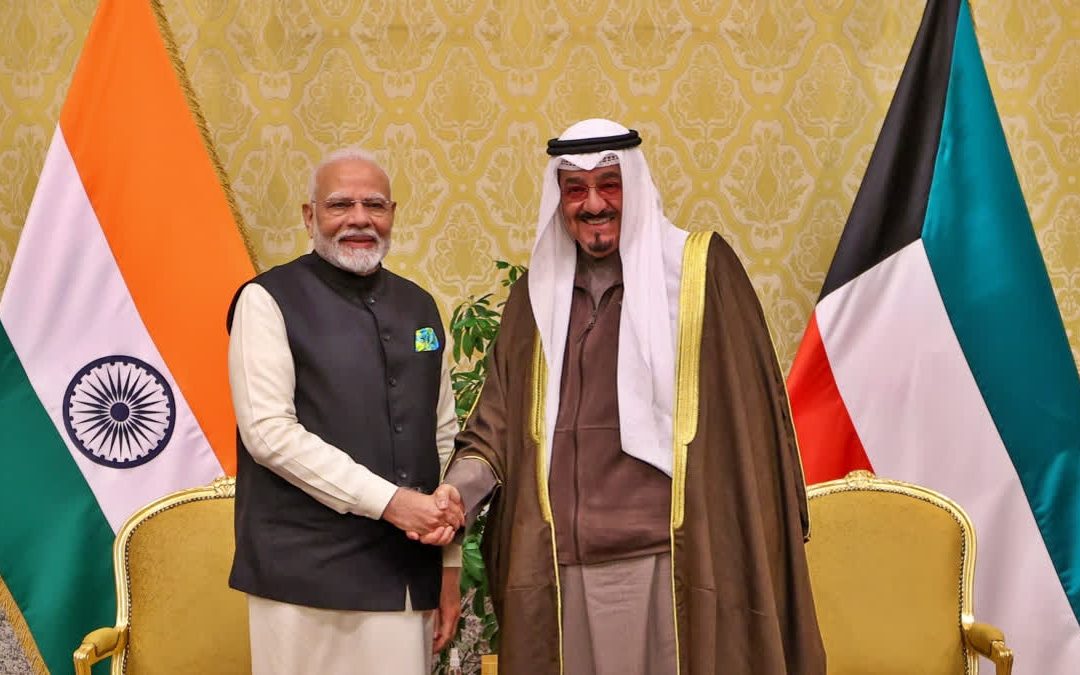Kuwait City: In a historic visit to Kuwait, Prime Minister Narendra Modi marked the first trip by an Indian Prime Minister to the Gulf nation in 43 years. During the visit, India and Kuwait signed a landmark agreement aimed at strengthening defence cooperation and elevating their bilateral relations to a strategic partnership. This agreement is part of India’s broader strategy to deepen security and defence ties with countries in the Gulf region.
The Indian government described the new defence agreement as one that will “institutionalise bilateral cooperation” in key areas such as joint military exercises, defence personnel training, coastal defence, maritime safety, and the joint development and production of defence equipment. This agreement reflects India’s growing emphasis on security collaboration with Gulf nations.
An important aspect of the visit was the mutual commitment to counter-terrorism efforts. Kuwait joined India in strongly condemning terrorism in all its forms, including cross-border terrorism. Both nations emphasized the need to disrupt terrorism financing networks, dismantle terror infrastructure, and enhance cooperation in counter-terrorism operations. The two sides also agreed to intensify information and intelligence sharing and strengthen law enforcement, as well as tackle issues such as money laundering, drug trafficking, and other crimes.
Prime Minister Modi also held bilateral talks with Kuwait’s Prime Minister, Sheikh Ahmad Al-Abdullah Al-Ahmad Al-Sabah, focusing on a comprehensive roadmap to expand their strategic partnership in several areas, including political and trade relations, investment, energy, defence, and security cooperation.
West Asia Situation and Ceasefire Efforts
During his visit, Modi also met with Kuwait’s Amir, Sheikh Meshal Al-Ahmad Al-Jaber Al-Sabah, and Crown Prince Sheikh Sabah Al-Khaled Al-Sabah Al-Hamad Al-Mubarak Al-Sabah. The discussions took place amid ongoing international efforts to broker a ceasefire in Gaza. Kuwait, which holds the presidency of the Gulf Cooperation Council (GCC), had recently called for a temporary ceasefire at a GCC summit it hosted. While neither side officially commented on the Gaza situation or broader West Asia issues, it is believed that the situation was discussed, with India reiterating its support for a ceasefire and a two-state solution to the Israeli-Palestinian conflict.
In his meeting with the Amir, Modi expressed appreciation for Kuwait’s role in ensuring the welfare of over 1 million Indian nationals living in Kuwait. He also invited the Amir to visit India. The two leaders reaffirmed the strong historical and friendly ties between their nations and agreed to elevate their relationship to a strategic partnership.
Kuwait’s Role in India-GCC Cooperation
As the current Chair of the GCC, Kuwait assured India of its full support for deepening India-GCC cooperation under the newly adopted ‘joint action plan’, which covers key areas such as health, trade, security, agriculture, food security, transportation, and energy. Both sides underscored the importance of the early conclusion of the India-GCC Free Trade Agreement, which would enhance economic ties.
Trade has long been a cornerstone of India-Kuwait relations, and the two countries emphasized the potential for further growth and diversification in their bilateral trade. The leaders also discussed the promotion of business delegations and the strengthening of institutional linkages. Kuwait expressed its interest in exploring investment opportunities in India across various sectors.
This visit signals a new chapter in India-Kuwait relations, as both countries work towards building a comprehensive, multifaceted strategic partnership.






